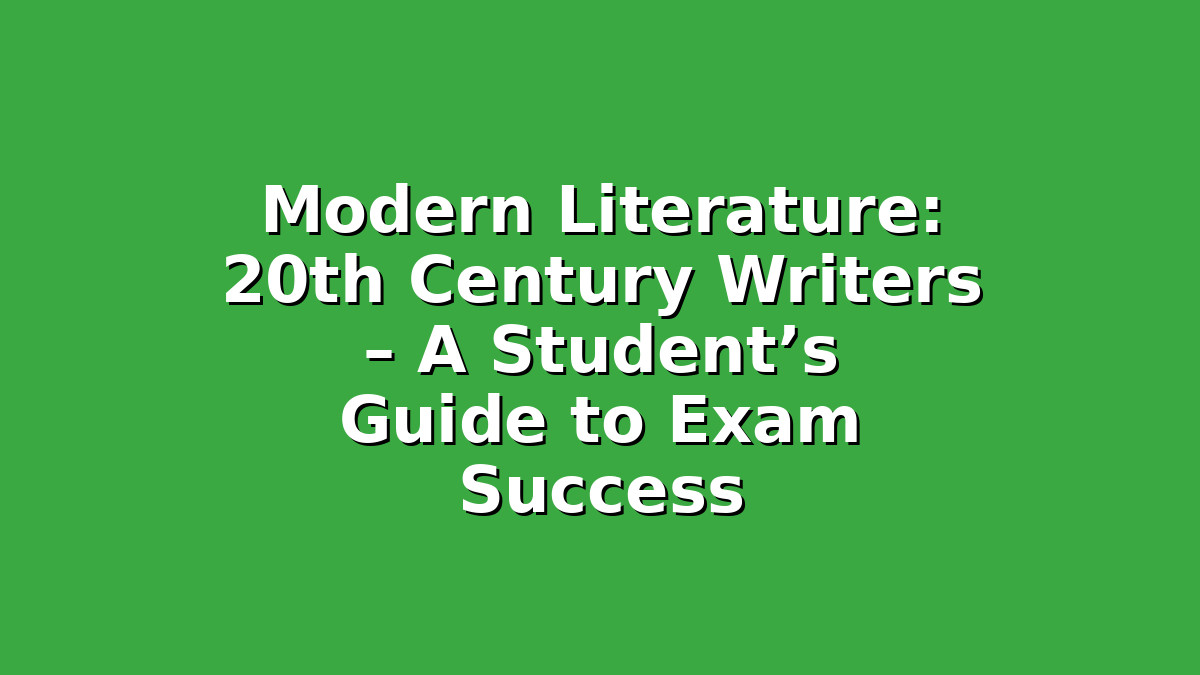Modern literature, especially that of the 20th century, marks a fascinating and transformative period in literary history. For students preparing for exams, understanding the key writers and movements of this era is essential—not just to grasp the texts themselves but also to appreciate their cultural and historical significance. This article will guide you through the most important aspects of 20th-century literature, providing study tips and strategies to help you excel in your exams with confidence.
Introduction to 20th Century Literature
The 20th century was a time of rapid change and innovation, and this was reflected in the literature produced. Writers experimented with new styles, themes, and narrative techniques, responding to world events like the World Wars, the Great Depression, and cultural shifts such as feminism and civil rights. From the stream-of-consciousness of Virginia Woolf to the existential questions posed by Albert Camus, modern literature challenges readers to think critically about identity, society, and the human condition.
As a student, diving into 20th-century writers can feel overwhelming due to the diversity and complexity of the works. However, with a structured approach and the right study methods, you can master these texts effectively. Let’s explore three key strategies to help you prepare.
Section 1: Understand the Historical and Cultural Context
One of the biggest challenges in studying 20th-century literature is the historical and cultural backdrop that shapes the themes and styles of the texts. Writers often responded directly to the upheavals of their time, so understanding these contexts will deepen your comprehension and enrich your essays.
Study Tips:
– Create a Timeline: Make a timeline of major events in the 20th century (World War I and II, the Great Depression, the Cold War, civil rights movements) and note when key authors published their works. This visual aid will help you see how history influenced literature.
– Connect Themes to Events: For example, consider how the disillusionment following World War I influenced the “Lost Generation” writers like Ernest Hemingway and F. Scott Fitzgerald. Similarly, the absurdity and fragmentation seen in Samuel Beckett’s plays relate to the existential crises after World War II.
– Use Supplementary Resources: Watch documentaries or read summaries about the historical period related to your texts. This can provide a clearer picture than just relying on textbooks.
By situating writers within their historical moments, you’ll be able to discuss how literature reflects broader societal concerns, which is often a significant part of exam questions.
Section 2: Analyze Key Literary Techniques and Themes
20th-century writers pushed the boundaries of traditional storytelling. Modernist writers like James Joyce and T.S. Eliot broke with linear narratives, while postmodernists like Kurt Vonnegut questioned reality and truth. To succeed in exams, you need to recognize and analyze these literary techniques and recurring themes.
Study Tips:
– Focus on Major Techniques: Learn about stream-of-consciousness, unreliable narrators, fragmentation, symbolism, and irony. Being able to identify these devices in a passage and explain their effect is crucial for close reading questions.
– Create a Vocabulary List: Compile definitions and examples of literary terms relevant to your syllabus. This will help you use precise language in essays and make your analysis more convincing.
– Practice Thematic Essays: Common themes in 20th-century literature include alienation, the search for identity, the critique of society, and the impact of technology. Write practice essays or outlines exploring how different authors treat these themes. For example, compare how Franz Kafka and Jean-Paul Sartre explore existential anxiety.
– Use Quotations Effectively: Memorize key quotes from the texts you study and understand their significance. In exams, quoting effectively can demonstrate your familiarity with the text and support your arguments.
By mastering literary techniques and themes, you can write essays that are insightful and well-structured, impressing your examiners.
Section 3: Develop Effective Study Habits and Exam Strategies
Studying modern literature is not just about reading and memorizing—it’s about engaging deeply with texts and thinking critically. Good study habits and smart exam strategies will help you manage your time and stress.
Study Tips:
– Active Reading: Don’t just passively read the texts. Annotate your copies with notes, questions, and observations. Highlight important passages that illustrate key themes or techniques.
– Group Study: Discussing texts with classmates can offer new perspectives and clarify confusing parts. Teaching others what you’ve learned is also a powerful way to reinforce your knowledge.
– Practice Past Papers: Familiarize yourself with the format of your exams by practicing past essay questions and timed responses. This will build your confidence and improve your writing under time constraints.
– Plan Your Essays: Develop a clear essay structure—introduction, body paragraphs each focusing on a main point, and a conclusion. Planning before writing helps keep your arguments focused and coherent.
– Stay Balanced: Finally, maintain a healthy study routine. Take breaks, get enough sleep, and stay hydrated. A well-rested mind retains information better and thinks more clearly during exams.
By cultivating these habits, you’ll build both comprehension and exam stamina, leading to better performance.
Conclusion: Embrace the Challenge with Confidence
Studying 20th-century modern literature offers an exciting lens into some of the most profound questions about humanity and society. While it may seem complex at first, approaching it with a structured plan—understanding context, analyzing literary techniques, and developing strong study habits—can make a significant difference in your exam success.
Remember, every great writer was once a student too, learning their craft step by step. Stay curious, be patient with yourself, and don’t hesitate to seek help from teachers or peers when needed. With dedication and smart preparation, you can master modern literature and perform confidently in your exams.
Good luck, and happy studying!

Responses